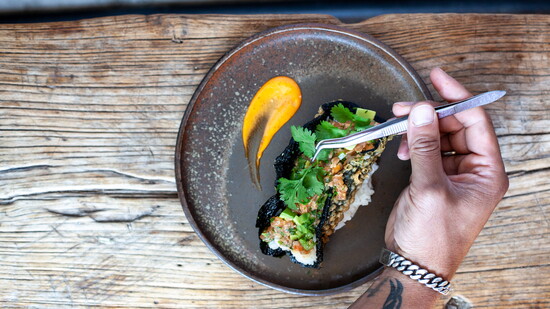I met Chef and Restaurateur Amante Domingo on a Monday, the industry’s day off. I walked into the dimly lit, primitive but elegant space, and I heard a friendly “hello” with a smile from across the restaurant.
His greeting was so warm, like we had been friends for years, even though we were meeting for the first time. I later observed him treat each one of his cooks and employees with the same kindness and engagement.
He was wearing a white t-shirt and denim, with a 1950s Navajo Squash blossom necklace, and it all paired perfectly with his tattoos. We sat down, and he offered me a Powerade. I laughed at the randomness of being offered Powerade by one of the city’s top chefs, and he explained that he keeps it on tap for his line cooks. We sat and sipped blue Powerade out of glasses while he began to tell me the story of NOKA.
“Noka means farmer after my dad, and all of this wood and metal is from the barn that was in the family for over two hundred years,” he said as he gestured to the space around us that felt rustic and refined at the same time.
It became clear early in our conversation that this space was deeply personal, almost like it was sacred.
“I grew up in Saint Joseph on an organic farm,” Amante began. “And we worked every morning. I had to milk goats before I went to school, and we worked hard to make a farm-to-table, sustainable living growing up.”
He talked about his mother, a California native, spiritual healer, painter, and art director, who worked with a long list of celebrities.
“First and foremost, one of the biggest parts of who I am is a small glimpse of my mother,” he said. “And her really being the person that she decided that she came here to be, and having that as an example always led me.”
Amante recalled early formative memories. The pain of losing his birth father at the age of seven, and how his mother later met his stepfather at a spiritual healing conference, where they fell in love.
“We packed up like the Jetsons,” he said with a big smile. “Literally, like a trailer on the back of a moving truck and us crammed in the back…moved to St. Joe, where there was a family farm on my stepdad’s side of the family.”
It was in St. Joe that his parents purchased and operated a vegetarian farm-to-table restaurant.
“They were so far ahead of their time,” he said. “They were on the cover of the St. Joe News Press doing yoga, and my dad was doing upward dog into the camera. And all the kids the next day in elementary school called me “yoga boy. I wore essential oils as a kid…and I thought that was so traumatic. But looking back on it, they were just 30 years ahead of their time.”
Amante shared how he went to see his dad in the hospital shortly before he passed away.
His dad kept saying there was a sushi restaurant that he wanted to take him to. Amanti promised that they would go when his dad was out of the hospital. That was their last conversation. That conversation became the inspiration for Amanti’s next restaurant concept.
With that and the physical materials from his dad’s barn, he built NOKA with his own hands and with the help of his managers, over the course of nine months. Everything in the space is very much his dad’s taste, like the Tibetan tiger rug hanging over the stairs.
Hanging near the bar is a flag by local fiber artist Taylor Triano that reads, Wabi Sabi Kansas City.
“That’s kind of our mantra,” Amante explained. “Wabi-Sabi is the Japanese ideal that things are perfectly imperfect, and always changing and growing.”
He described it using an example of a perfectly shaped clay pot. When it is touched and impacted by a person, it is thrown slightly out of balance. But that is what gives the pot its character. That is Wabi-Sabi. Building a restaurant out of 150-year-old wood, when he couldn’t get a straight cut, forced him to embrace Wabi-Sabi.
NOKA’s interior reflects the beauty of “perfectly imperfect,” and the food does as well. Amante spoke with confidence about how he learned to celebrate the theme of Japanese cuisine without feeling the need to make it strictly and authentically Japanese. Instead, over time, the menu has become a unique expression of Japanese cuisine influenced by Kansas City, our regional tastes, and his own style.
“Noka is a Japanese word, but it’s not Japanese food. It’s an expression,” he said. “How do you take these classics, and then how do you put your own style on them?”
My experience of NOKA was much like my first impression of the Chef behind it- interesting, inspiring, exciting, and beautiful, but also completely disarming and approachable.
Amante Domingo is the creator and owner of three beloved Kansas City restaurants:
The Russell
A hearty and seasonally-driven daytime wood-fired Grill. Offering famously good catering.
Noka
Japanese inspired cuisine, stylishly presented for a beautiful, warm, and hospitable dining experience
Le Champion
Coffee bar and lounge with a vintage Ralph Lauren feel and upscale bar bites and cocktails
“That’s kind of our mantra...Wabi-Sabi is the Japanese ideal that things are perfectly imperfect, and always changing and growing.”
